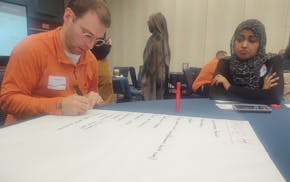Picture books are aimed at our youngest readers, using simple, understandable language and concepts. One at a Rochester elementary school library until recently also includes scenes of bondage apparel and public nudity.
They're a jarring inclusion in author/illustrator Emily Neilson's otherwise delightful picture book "The Rainbow Parade." Objections to the illustrations have popped up coast-to-coast since publication in 2022. Was Neilson hoping the notoriety would sell books, perhaps, a la "Maus"? Or maybe her book, written as a memoir of visiting the San Francisco Pride Parade with her two mothers, is simply an honest reflection of what transpires at a Pride parade, or, at least that Pride parade.
The Rochester school district recently pulled "The Rainbow Parade" off its elementary school library shelf. Under rules passed last month that gave the school superintendent the final call, Superintendent Kent Pekel overruled the district's review committee, which had voted 9-1 for the book to stay on the shelf.
Pekel has been called dictatorial and bigoted on social media for his decision. You could also call him courageous and decisive, willing to take heat for acting in the best interest of the kids.
Despite the fun and colorful book cover, "The Rainbow Parade" hits hard in the first pages, with two men along the parade route wearing bondage harnesses and holding hands. One has a chain around his neck, and the other man holds a leash connected to the chain. Consenting adults are free to indulge their sexual proclivities in private, but — in a picture book? For young readers? Really?
Surprisingly, the bondage gear did not appear to trigger the superintendent as much as the public nudity. There's a naked woman twirling hula hoops on a sidewalk and you can see the backside of another nude woman strolling down the road.
Nudity is the reason Pekel gave for removing the book from the school library after a first-grade student brought it home, prompting a complaint from the student's parent. The book went to a review by a committee of community members, a secondary student, teachers, library media specialists and equity specialists.
Advocates for "The Rainbow Parade" argued that it had received starred reviews from the School Library Journal, Publishers Weekly, Booklist and Kirkus Reviews and that it filled a need in the school for "authentic family structures and experiences of underrepresented people in our school, community, and in the world."
Reached Wednesday, Pekel said that the book is out of sync with state laws banning public nudity, as well as inappropriate for its target age group. He said the book was not banned for its LGBTQ theme, which would run afoul of a different state law aimed at preventing book bans.
"I strongly support inclusion of books that introduce students to and celebrate the lives and experiences of LGBTQ people in our libraries and our classrooms," he wrote in a Jan. 3 memo to the Rochester School Board. He also pointed out that public nudity has nothing to do with sexual orientation or gender identity. Neither does bondage, I might add.
Instead, Pekel cited district policy and state law in allowing the removal of books based on "the appropriateness of potentially sensitive topics for the library's intended audience," as well as district policy that books should not be "vulgar or lewd to a degree that it is educationally unsuitable for students in the school given their ages and levels of maturity."
Pekel, 57, was in fourth grade when his father came out as gay. It shook his world, he said, and there were no books in the library that could have helped him make sense of that, and there was also no support or understanding in the larger society. Though he told the board that he would have no problem reading the book to his own children, he told me that he has to consider the complicated mesh of cultures of the entire student body, including some whose religious beliefs preclude viewing of nude bodies.
Book banning has been a hot topic in recent years, with white Christian evangelicals leading the charge, and LGBTQ content, often unfairly, taking the brunt of their wrath. There have also been book bans from the left, sometimes even coming from the authors or their estates, targeting books that insensitively portrayed minority characters, used racist language, or were seen as cultural appropriation.
The often heated discussions of who may read or write what roll through the ages as society grapples with questions of decency, morality, age appropriateness, censorship, freedom of speech, and artistic license. Wrestling with these questions is good because they don't come with easy answers, and the more thoughtful and brave and candid we can be, the better the answers.
I never thought I would find common cause with book banning groups like Moms For Liberty. But you've gotta ask, what's next? Disney characters smoking pot? Picture books on how to shoot and gut a deer? I would hope a publisher would laugh those book ideas out the door, at least for our youngest readers. They are topics for older readers. Much older. The author and publisher of "The Rainbow Parade" missed a chance here to share an otherwise beautiful message with young children.

Tolkkinen: Brainerd City Council should spend a night, or 30, sleeping outdoors

Tolkkinen: I love the rural life, but I'm not driving to town for one paintbrush

Tolkkinen: Rural Minnesota Trump supporters stand by their guy

Tolkkinen: As the GOP looks to trim Medicaid, rural Minnesotans tally the cost


